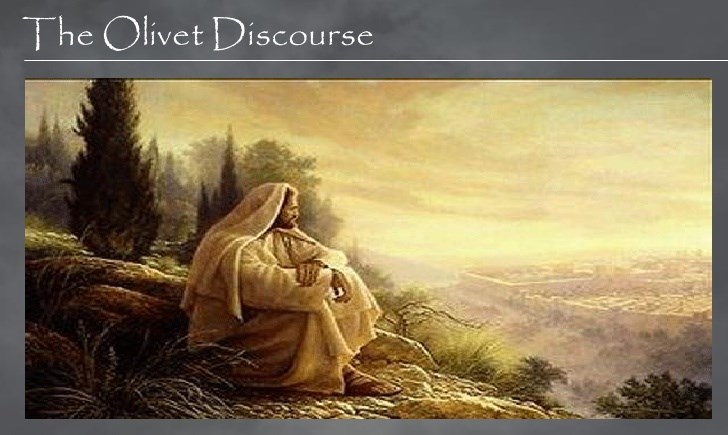 Photo Credit – slidesharecdn.com
Photo Credit – slidesharecdn.com
[Adapted from the Archives]
When He [Jesus] entered the temple, the chief priests and the elders of the people came to Him while He was teaching, and said, “By what authority are You doing these things, and who gave You this authority?” – Matthew 21:23
On this long day, Jesus would demonstrate in one situation after another that he spoke and acted with the authority of God Himself. The barren fig tree cursed by Jesus the day before had indeed withered and died. The disciples saw it themselves that morning as they walked again from Bethany to Jerusalem. Jesus spoke to them of faith, which they would need all the more in the days ahead (Matthew 21:21-22).
Again and again…in Jerusalem, in the Temple, and on the busy streets during Passover, Jesus was confronted by the religious leaders.
It’s amazing that he even gained entry to the Temple after overturning the market just the day before. Again, another sign of his authority. He was untouchable, until he gave himself over to his own death on the cross…for us.
The religious leaders were determined to trap him in some sort of blasphemous teaching or interpretation of the law. It would not happen, yet they were set on his destruction one way or another.
In an attempt to test Jesus’ understanding of the law, a legal advisor to the Pharisees asked Jesus what was the greatest commandment in the law. The Pharisees emphasized strict adherence to the laws of the Torah, all 613 of them! They were not prepared for Jesus’ response:
Jesus answered, “The foremost is, ‘Hear, O Israel! The Lord our God is One Lord; and you shall love the Lord your God with all your heart, and with all your soul, and with all your mind, and with all your strength.’ The second is this, ‘You shall love your neighbor as yourself.’ There is no other commandment greater than these.” – Mark 12:29-31
Two commands: 1) Love God with your whole being; 2) Love your neighbor as yourself. Some might say that a third is presumed in that you must love yourself in a right and wholesome way in order to truly love others.
Jesus’ love for the Father and his love for all people were in perfect unity. Loving God, with all we are, gives us perspective and capacity to love those around us, whomever they are, as we have experienced love ourselves, from the God who loves us perfectly and completely.
The Pharisees, Sadducees, and other Jewish leaders grew more angry at Jesus and were vexed as to how to destroy his popularity and influence with the masses of Jews loyal to him. All their trickery failed this time. Jesus was not intimidated by them, and in fact, spoke some of his strongest words against them while teaching that day.
His 8 “woe to you” pronouncements against the Pharisees are listed at bottom of this page. When I read them, the song from the original Godspell film comes to mind as the Jesus character stands against the religious “machine” of his day – those “hypocrites”, those “blind guides” of the people.
 Photo Credit: www.faithbibleministries.com
Photo Credit: www.faithbibleministries.com
Finally, leaving Jerusalem that day, Jesus stopped on the Mount of Olives (Olivet) to speak about the future. He talked at length, to his disciples and all those who followed, about the end times. He cautioned them about false teachers and the evil that would rise up in those last days. What it must have been to listen to Jesus, the Messiah, on that Tuesday – filled with a mixture of faith in him and fear of what could lie ahead for them, and the generations to come.
When Jesus and his disciples returned for the evening to Bethany, Judas Iscariot, one of the twelve, stole away and met with Jesus’ enemies. [Matthew 26:14-16] In the dark of night, he would betray Jesus to them. He acted as a coward, away from the crowds who would have strongly objected…
For 30 pieces of silver, Judas would seemingly take history into his own hands, but the clock was already ticking, and Jesus would finish what he came to earth to do.
Postscript:
8 “Woe’s” Spoken by Jesus Against the Pharisees (Matthew 23:13-30)
1- Woe to you, scribes and Pharisees, hypocrites! for you shut up the kingdom of Heaven against men.
2- Woe to you, scribes and Pharisees, hypocrites! for you devour widows’ houses, and pray at length as a pretense.
3– Woe to you, scribes and Pharisees, hypocrites! for you travel land and sea to win one proselyte, and when he is won, you make him twice as much a son of hell as yourselves.
4- Woe to you, blind guides, who say, “Whoever swears by the temple, it is nothing; but whoever swears by the gold of the temple, he is obliged to perform it.”
5- Woe to you, scribes and Pharisees, hypocrites! for you pay tithe of mint and anise and cumin, and have neglected the weightier matters of the law: justice and mercy and faith.
6- Woe to you, scribes and Pharisees, hypocrites! for you cleanse the outside of the cup and dish, but inside they are full of extortion and self-indulgence.
7- Woe to you, scribes and Pharisees, hypocrites! for you are like whitewashed tombs which indeed appear beautiful outwardly, but inside are full of dead men’s bones and all uncleanness.
8- Woe to you, scribes and Pharisees, hypocrites! Because you build the tombs of the prophets and adorn the monuments of the righteous, and say, “If we had lived in the days of our fathers, we would not have been partakers with them in the blood of the prophets.”*
Holy Week – Day 3: Tuesday in Jerusalem, Mount of Olives – Mary Fairchild
YouTube video Alas for You from the original film Godspell
Spotify Playlist – From Palm Sunday to the Resurrection – Beth Wayland
The Way of Jesus #2: Unsettling the Religious Status Quo – James Nored & Phil Ware
Experience Easter – From Genesis to Revelation – K-Love
Reasoning Why Jesus Cursed the Fig Tree – Sam Shamoun
*8 Woes Upon the Pharisees – Curtis Kittrell
Great Texts of the Bible – The Two Commandments – commentary by James Hastings
Jesus’ Olivet Discourse about Two Future Events – Ronald W. Leigh, Ph.D



























